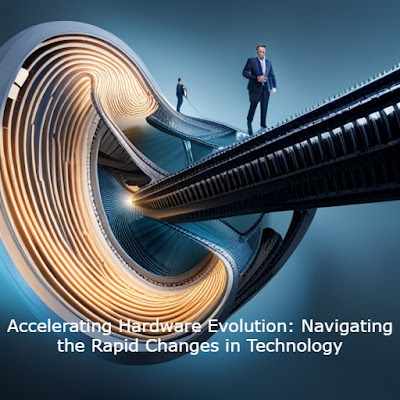In today's fast-paced world, technological evolution is occurring at an unprecedented rate. One of the most prominent aspects of this evolution is the rapid development of hardware. From smartphones and laptops to data centers and gaming consoles, hardware components are constantly changing and improving. This article explores the phenomenon of accelerating hardware evolution and how individuals and industries are navigating these rapid changes.
The Need for Speed
The term "Moore's Law" has become synonymous with the rapid evolution of hardware. Coined by Gordon Moore, the co-founder of Intel, in 1965, this observation posited that the number of transistors on a microchip would double approximately every two years. While Moore's Law has undergone some modifications and reinterpretations over the years, it has largely held true, driving exponential growth in computing power.
Consider the smartphone in your pocket. Over the past decade, these pocket-sized devices have evolved from basic communication tools into powerful computers. Each new generation of smartphones boasts faster processors, improved cameras, and better displays. The rapid hardware evolution has transformed these devices into multifunctional tools that can handle tasks ranging from browsing the internet to gaming, from photography to augmented reality.
The Role of Competition
Competition among technology companies plays a significant role in driving the acceleration of hardware evolution. Companies are constantly striving to outdo one another, pushing the boundaries of what is possible. For example, the rivalry between Intel and AMD in the CPU market has led to continuous improvements in processing power and energy efficiency. Similarly, Nvidia and AMD compete fiercely in the graphics card market, driving advancements in rendering and gaming performance.
One of the most exciting developments in recent years has been the emergence of new players in the hardware space. Companies like Apple and Tesla have entered the market with innovative hardware solutions that challenge traditional players. Apple's custom-designed M1 chip for its Mac computers is a prime example of how new entrants can disrupt the status quo. By designing its own chip architecture, Apple was able to create a powerful and energy-efficient processor that outperforms many traditional x86 chips.
Industry Applications
The rapid evolution of hardware has profound implications for various industries. Let's explore a few examples:
1. Healthcare: Medical devices and equipment are becoming increasingly sophisticated thanks to advances in hardware. From wearable fitness trackers that monitor vital signs to MRI machines with improved imaging capabilities, healthcare professionals are benefiting from hardware innovation. These advancements lead to better patient care and diagnostics.
2. Automotive: The automotive industry is undergoing a transformation with the development of electric and autonomous vehicles. Hardware plays a central role in these innovations, from the batteries that power electric cars to the sensors and processors that enable self-driving capabilities. As hardware evolves, so too will the capabilities of the vehicles we drive.
3. Entertainment: Gaming consoles and PCs are prime examples of hardware-intensive entertainment systems. The gaming industry constantly pushes the limits of hardware to deliver more realistic graphics and immersive experiences. The rapid evolution of graphics cards, CPUs, and storage technologies has enabled gamers to enjoy increasingly lifelike and interactive games.
4. Data Centers: The backbone of the digital world, data centers rely heavily on hardware to process and store vast amounts of data. Advances in server technology, storage solutions, and networking equipment have allowed data centers to become more efficient and capable of handling the growing demands of cloud computing and big data analytics.
Challenges of Rapid Hardware Evolution
While the rapid evolution of hardware brings many benefits, it also presents challenges:
1. Compatibility: As hardware evolves, older devices and software may become incompatible with newer components. This can lead to issues for users who need to upgrade their entire system to take advantage of the latest hardware innovations.
2. Environmental Concerns: The production and disposal of hardware components have environmental impacts. The rapid turnover of hardware can lead to e-waste, contributing to electronic waste disposal challenges. Manufacturers are under increasing pressure to develop more sustainable hardware solutions.
3. Cost: Staying on the cutting edge of hardware can be expensive. Individuals and businesses must decide when and how to upgrade their hardware to balance performance improvements with budget constraints.
Navigating the Future
In a world of accelerating hardware evolution, staying informed and adaptable is key. Here are some strategies for navigating the rapid changes in technology:
1. Continuous Learning: Stay up-to-date with the latest hardware trends and developments. Online courses, tech blogs, and industry conferences can provide valuable insights.
2. Long-Term Planning: Consider your hardware needs in the context of your long-term goals. Investing in hardware that offers future-proofing can save you from frequent upgrades.
3. Eco-Friendly Choices: When possible, choose hardware that is designed with sustainability in mind. Look for energy-efficient components and consider recycling or donating old hardware.
4. Industry Collaboration: Industries and businesses should collaborate with hardware manufacturers to ensure that evolving technology aligns with their needs and goals.
5. User Experience Focus: Prioritize hardware upgrades that enhance the user experience. Consider how hardware improvements can benefit productivity, efficiency, or creativity.
In conclusion, the accelerating evolution of hardware is transforming the way we live, work, and play. From consumer electronics to critical infrastructure, hardware innovation is reshaping our world. While challenges exist, the opportunities for progress and growth are immense. By embracing change, staying informed, and making thoughtful choices, individuals and industries can navigate the rapid changes in technology and harness the power of evolving hardware to drive innovation and success.










No comments:
Post a Comment